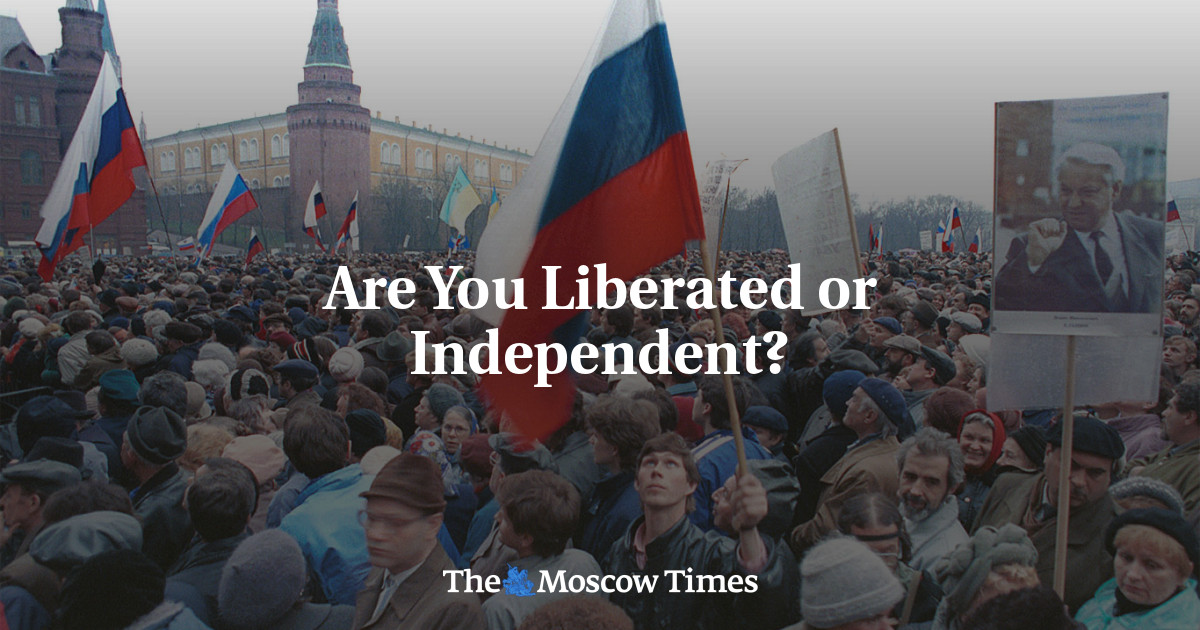
Независимость: independence, self-sufficiency
In the part of the world I’m in, November seems to be particularly rich in state holidays of independence. In the Russian language these holidays are sometimes of освобождение (liberty, freedom) and sometimes of независимость (independence, freedom). So what’s the difference?
Освобождение (freedom) is related to the verb pair освобождать/освободить, which means to free or release someone or something. If you want to express becoming free with no mention of what or whom you are freeing yourself from, you use the intransitive versions of the verb pair: освобождаться/освободиться.
In general, you use освобождение when you are describing being freed from (от) someone or something. For example, it’s национально-освободительное движение (national liberation movement) because the kind of movement “ведёт борьбу за освобождение какого-либо этноса от иностранного господства” (conducts a battle for the liberation of an ethnic group from foreign rule).
There is, for example, Международный день освобождения узников фашистских концлагерей (International Day of Liberation of Prisoners from Nazi Concentration Camps). And in Russia virtually every region in the western part of the country marks liberation from occupation during what they call the Great Patriotic War (Великая Отечественная война), such as День освобождения Краснодарского края от немецко-фашистских захватчиков (The Day of the Liberation of Krasnodar from the Nazi Occupiers).
In Russian you can read: в США отмечается День освобождения рабов (in the US they celebrate the Day of the Liberation of Slaves) which in English is called Juneteenth (a real trial for translators). In Russia they mark освобождение крестьян от крепостного права (the liberation of peasants from serfdom). Or you might lobby for this kind of liberation: Одним из главных требований оппозиционеров было освобождение политзаключенных. (One of the main demands of the opposition was the release of political prisoners).
But a lot of освобождение is more prosaic. In business and taxes it can refer to a kind of exemption. Министр по электронной торговле надеется привлечь офшорный бизнес освобождением от налогов и другими льготами (The Minister of E-Commerce hopes to attract offshore business by tax exemption and other benefits). Одна тема кампании — освобождение сельхозпроизводителей от посредников (One topic in the campaign was getting rid of the middlemen for agricultural producers).
Освобождение can also be a kind of release, from legal to emotional: Придётся подписать это заявление об освобождении от ответственности (You have to sign a liability release declaration). Смех обеспечивает физическое и эмоциональное освобождение (Laughter provides a physical and emotional release).
And it is the way you describe firing someone: Мы рекомендуем освободить его от должности (We recommend that he be dismissed from his position). To the non-Russian ear, this sounds almost pleasant – being freed from your position — but it’s usually not a lot of fun: Государственная Дума вправе освободить от должности Председателя Банка России (The State Duma has the right to dismiss the Chairman of the Bank of Russia).
Or, on second thought, that might be a blessing for the one being dismissed.
You get the idea: освобождение is liberation from something. It is, of course, related to the word свобода, which is a kind of freedom, from the everyday ‘вы свободны’ (at a meeting: you’re dismissed; at the end of the working day: your shift is over) to the lofty дайте мне свободу или дайте мне смерть! (give me liberty or give me death!)
Независимость, on the other hand, emphasizes not the process of liberation but the state of being independent, sovereign, self-sufficient, or autonomous. In most cases the key is the notion of not being under the influence of some person/people or thing(s). This is why it’s the word used to describe the desired status of the judiciary: В старой судебной системе формально тоже провозглашался принцип независимости судей: “Судьи независимы… и подчиняются только закону ” (In the old judicial system the principle of the independence of judges was also formally declared: “Judges are independent… and only subject to the law”).
You might come across this interesting term for interfering in judiciary autonomy: Говорили о “телефонном праве” как антиподе независимости суда (They spoke about “telephone law” as the opposite of an independent judiciary). Тhis is also called позвоночное право (phone-call law) or решение вопросов по звонку (solving problems with a phone call).
Independence might be economic: Они могут обеспечить себе экономическую независимость за счёт продажи газет и рекламы (They can become financially independent by selling newspapers and advertisements). Or it might be emotional — and require a descriptive translation: Ирина — самостоятельна и независима (Irina can take care of herself and is independent).
And speaking of independent, liberated women — Russian has a variety of ways of translating women’s liberation: движение за освобождение женщин (the movement for the liberation of women); обеспечение равноправия женщин (provision of equal rights to women); эмансипация женщин (women’s emancipation); and феминистское движение за уравнение женщин в правах с мужчинами (the feminist movement for women to have equal rights with men). Actually, all of these versions are too narrow; it’s interesting that no one suggested освободительное движение (liberation movement).
So, as far as I can tell, the words most commonly used when countries are battling for independence are освобождение (от) (liberation from) and борьба за свободу (the battle for freedom). But when they are free and sovereign nations, the words used more often are независимый (independent) and независимость (independence).
That would make sense. In any case, when the U.S. liberated itself, it began to celebrate Independence Day, which gets rendered in Russian as День независимости — a state we all aspire to.
Leave a Reply